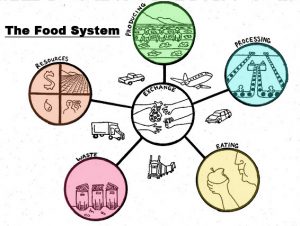I have spent the past few months settling in to my new role with the NC Growing Together Project, (NCGT) which aims to bring more local food products into mainstream wholesale markets across North Carolina.
One of my roles is to engage planners, economic developers, and small business assistance providers in understanding the local food supply chain in North Carolina and identifying ways to create an enabling and supportive environment for farms and food entrepreneurs.

It’s been a really fun experiment to flip the engagement process upside down – thinking about creative ways to engage the local government staff in cities, counties, and towns in their local food system, both as citizens and as professionals.
In a way, this seems counter-intuitive, because these staff members are professionals, neutral in their positions and often working on non-food related development (e.g., reviewing endless permits, recruiting big manufacturers, or supporting other types of small businesses).
However, it’s been a surprising few months, as I’ve watched relationships develop between the local government staff and the food and farm agencies across the state.
As in so many things, our planners, economic developers, and small business assistance providers are citizens—and eaters!—as well as professionals. They respond to the changes within their own communities, and want to see them prosper just as citizens do.

We’ve found tremendous overlap between food system work and the work of local governments. The connections are diverse:
- Land use regulations and incentives
- Open space protections
- Creation and retention of entrepreneurial small businesses
- Health and wellness, and
- Recruitment of larger companies looking for quality of life as a key component of their site selection strategies.
It’s been a rewarding process: NCGT has established partnerships with the US Economic Development Administration, the NC Rural Center, the UNC-Chapel Hill School of Government, and the NC Chapter of the American Planning Association.
We’ll be partnering with these organizations to develop training and resources that help local governments across the state to grasp the supply chain and be empowered to support it, creating jobs and building stronger, healthier communities in the process.
It’s important for us to consider this kind of “backwards” approach when we are working to engage citizens in the local government process.
Often, the lived experience of local government professionals can be a useful indicator and research tool as much as our formal engagement efforts If your town planner wants to shop at a farmers’ market, or participates in a local community-supported agriculture (CSA) program with her neighbors, then there’s a much greater chance of that desire being translated into policies and programs.
Local government staff support the things that citizens care about every day – and they are citizens themselves, an important consideration to remember when we are designing community engagement strategies. Allowing these staff to help design these strategies can often focus and refine engagement efforts toward issues in which citizens have an interest.
I’m really happy to be working to support something people care about all across this state…with the help of the dedicated and passionate local government professionals we are fortunate to have here!
Banner photo credit: Briana Brough.